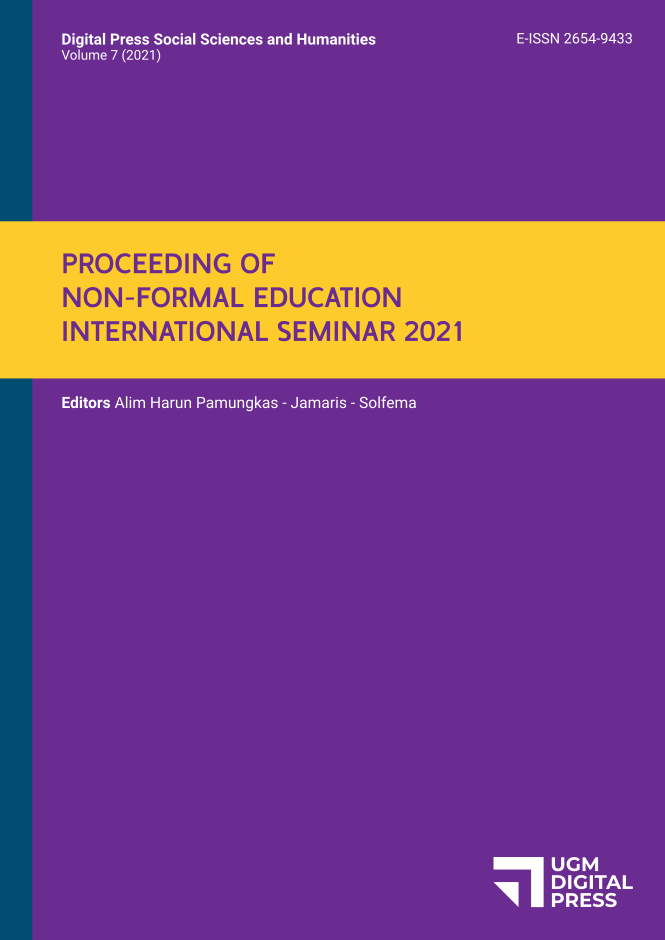Stimulation of Early Childhood Intelligence through Interest Approach based on the Family Environment in the Pandemic Era
Ismaniar
1
, Setiyo Utoyo
2
, Nur Hazizah
1
1
Department of Non Formal Education, Faculty of Education, Universitas Negeri Padang, Padang, Indonesia
2
Department of Early Childhood Education, Faculty of Education, Universitas Negeri Gorontalo, Gorontalo, Indonesia
ismaniar.js.pls@fip.unp.ac.id
Abstract
The application of learning programs from home as an effort to reduce the transmission of the covid virus has brought about several phenomena in the field, including learning stimulation that is not carried out optimally, parents feel very bothered, and children are depressed and so on. All of this happened allegedly because some parents did not understand the approach to learning in early childhood. This research uses a literature study approach by utilizing various sources, both printed and online. From the results and discussion, it can be concluded that; 1. To optimize the results of intelligence stimulation/learning done at home, parents must understand the characteristics of early childhood learning in general, including children who like to play, each child is unique, and children like to imitate people in their environment. 2. Learning will take place well if parents understand and adapt the interests or tendencies of each child. 3. Every available space/spot in the home environment can be a fun place for intelligence stimulation for children if parents have sufficient understanding of the characteristics of an early child and the different interests of each child.
Keywords
Stimulation, Intelligence, interest approach, family environment, pandemic era
References
Fauziddin, M. (2016). Peningkatan Kemampuan Kerja Sama melalui Kegiatan Kerja Kelompok Pada Anak Kelompok A TK Kartika Salo Kabupaten Kampar. Jurnal PAUD Tambusai, 2(2), 36–42.
Ismaniar, I. (2018). MODEL PERMAINAN ESTAFET BAIT LAGU UNTUK MENINGKATKAN KEMAMPUAN PEMUSATAN PERHATIAN PADA ANAK. JPUD - Jurnal Pendidikan Usia Dini, 12(1), 77–87. https://doi.org/10.21009//JPUD.121.07
Ismaniar, I. (2020). Model Pengembangan Membaca Awal Anak (A. H. Pamungkas, Ed.). Padang: Jurusan Pendidikan Luar Sekolah FIP UNP.
Ismaniar, I., & Utoyo, S. (2020). “Mirror of Effect” dalam Perkembangan Perilaku Anak pada Masa Pandemi Covid 19. DIKLUS: Jurnal Pendidikan Luar Sekolah, 4(2), 147–157. Retrieved from https://journal.uny.ac.id/index.php/jurnaldiklus/article/view/32429
Slameto, S. (2013). Belajar dan Faktor-faktor Memengaruhi. Jakarta: Rineka Cipta.
Sugiyono, S. (2012). Memahami Penelitian Kualitatif. Bandung: Alfabeta.
Suryana, D., & Wahyudin, N. (2014). Dasar-Dasar Pendidikan TK. Jakarta: Universitas terbuka.
Walgito, B. (2010). Pengantar Psikologi Umun (19th ed.). Yogyakarta: Andi Yogyakarta.
Yulidar, Y., Syuraini, S., & Ismaniar, I. (2018). Gambaran Minat Warga Belajar Mengikuti Kegiatan Randai di Sanggar Seni Mustika Minang Duo Kota Pariaman. Spektrum: Jurnal Pendidikan Luar Sekolah (PLS), 1(2), 245. https://doi.org/10.24036/spektrumpls.v1i2.9489
Yuse, A. P., Jamaris, J., & Ismaniar, I. (2018). Penerapan Pembelajaran Orang Dewasa oleh Instruktur Pelatihan Keterampilan Menjahit di SPNF SKB Lima Puluh Kota. Spektrum: Jurnal Pendidikan Luar Sekolah (PLS), 1(1), 16. https://doi.org/10.24036/spektrumpls.v1i1.9199
Zed, M. (2014). Metode Penelitian Kepustakaan (3rd ed.). Jakarta: Yayasan Obor Indonesia.
2 Department of Early Childhood Education, Faculty of Education, Universitas Negeri Gorontalo, Gorontalo, Indonesia
ismaniar.js.pls@fip.unp.ac.id
Abstract
The application of learning programs from home as an effort to reduce the transmission of the covid virus has brought about several phenomena in the field, including learning stimulation that is not carried out optimally, parents feel very bothered, and children are depressed and so on. All of this happened allegedly because some parents did not understand the approach to learning in early childhood. This research uses a literature study approach by utilizing various sources, both printed and online. From the results and discussion, it can be concluded that; 1. To optimize the results of intelligence stimulation/learning done at home, parents must understand the characteristics of early childhood learning in general, including children who like to play, each child is unique, and children like to imitate people in their environment. 2. Learning will take place well if parents understand and adapt the interests or tendencies of each child. 3. Every available space/spot in the home environment can be a fun place for intelligence stimulation for children if parents have sufficient understanding of the characteristics of an early child and the different interests of each child.Keywords
Stimulation, Intelligence, interest approach, family environment, pandemic eraReferences
Fauziddin, M. (2016). Peningkatan Kemampuan Kerja Sama melalui Kegiatan Kerja Kelompok Pada Anak Kelompok A TK Kartika Salo Kabupaten Kampar. Jurnal PAUD Tambusai, 2(2), 36–42.
Ismaniar, I. (2018). MODEL PERMAINAN ESTAFET BAIT LAGU UNTUK MENINGKATKAN KEMAMPUAN PEMUSATAN PERHATIAN PADA ANAK. JPUD - Jurnal Pendidikan Usia Dini, 12(1), 77–87. https://doi.org/10.21009//JPUD.121.07
Ismaniar, I. (2020). Model Pengembangan Membaca Awal Anak (A. H. Pamungkas, Ed.). Padang: Jurusan Pendidikan Luar Sekolah FIP UNP.
Ismaniar, I., & Utoyo, S. (2020). “Mirror of Effect” dalam Perkembangan Perilaku Anak pada Masa Pandemi Covid 19. DIKLUS: Jurnal Pendidikan Luar Sekolah, 4(2), 147–157. Retrieved from https://journal.uny.ac.id/index.php/jurnaldiklus/article/view/32429
Slameto, S. (2013). Belajar dan Faktor-faktor Memengaruhi. Jakarta: Rineka Cipta.
Sugiyono, S. (2012). Memahami Penelitian Kualitatif. Bandung: Alfabeta.
Suryana, D., & Wahyudin, N. (2014). Dasar-Dasar Pendidikan TK. Jakarta: Universitas terbuka.
Walgito, B. (2010). Pengantar Psikologi Umun (19th ed.). Yogyakarta: Andi Yogyakarta.
Yulidar, Y., Syuraini, S., & Ismaniar, I. (2018). Gambaran Minat Warga Belajar Mengikuti Kegiatan Randai di Sanggar Seni Mustika Minang Duo Kota Pariaman. Spektrum: Jurnal Pendidikan Luar Sekolah (PLS), 1(2), 245. https://doi.org/10.24036/spektrumpls.v1i2.9489
Yuse, A. P., Jamaris, J., & Ismaniar, I. (2018). Penerapan Pembelajaran Orang Dewasa oleh Instruktur Pelatihan Keterampilan Menjahit di SPNF SKB Lima Puluh Kota. Spektrum: Jurnal Pendidikan Luar Sekolah (PLS), 1(1), 16. https://doi.org/10.24036/spektrumpls.v1i1.9199
Zed, M. (2014). Metode Penelitian Kepustakaan (3rd ed.). Jakarta: Yayasan Obor Indonesia.

